Procurement

TLM ensures the best quality drugs at the lowest cost through a quality drug procurement initiative and partnerships with direct relief, Difaem and CHI as well as Muhimbili National Hospital. Most standard clinical supplies are supplied by MNH through the hospital pharmacy. However, most oncology specific supplies such as bone marrow aspirate and biopsy needles, tru-cut needles, intra-thecal filters and intra-thecal chemotherapy etc., are currently not available in country and are imported from sources overseas. In addition all other supplies (including all chemotherapy) are purchased locally from small-scale retail pharmacies where significant markups are applied to the costs of the items. Almost every item used on the ward is a generic product and there is the additional concern regarding the quality of these products.
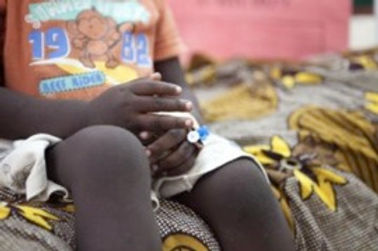
Recognizing that a reliable supply of drugs is essential to the delivery of care to our patients, we plan a single procurement process involving MNH/The Ministry of Health. This will enable us to negotiate more competitive prices and establishing reliable sources. We are in the process of working out the details of the procurement system but it will involve creating a tender document agreed by all involved (clinicians, pharmacists, nurses, donors, Ministry of health). This will also facilitate the importation of medications not currently available in Tanzania. Currently TLM procures 80% of all the drugs.
Pharmacy

TLM pharmacy systems are in place to strengthen the chemo room. The paediatric oncology main store, weekly store and daily store have a fully secure system in order to manage our precious stock and has a secure cold chain transport system with temperature loggers and reporting.
SOP’s
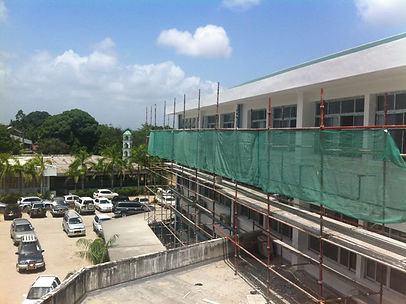
Using available literature standard operating procedures and clinical manuals have been developed that are locally appropriate and relevant to guide all clinical procedures and programme activities. These cover nursing, medical and psychosocial services and are shared in an open source manner to any new and Nationally approved paediatric oncology centre seeking to join the network. They are available in our resources section or hard copies can be shared if enquiries are made.
Paediatric Oncology Facilities
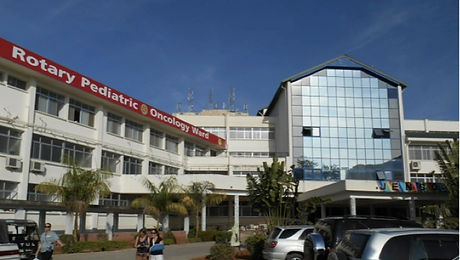
We have come a long way since the children’s cancer ward first opened in ORCI in 2004. First we moved the children to the Children’s department at MNH in 2011. This move gave us increased space for the children and instant access for the first time to all the facilities available in a modern busy University hospital. 2012 was a big year as the final move occurred when our Rotary Upendo Children’s cancer ward was completed. This ward added piped oxygen, air conditioned wards, isolation units, a procedures area, counselling space and a conference room. Also, in the same year the Ujasiri hostel was opened.
To date we have 11 partner facilities in our expanding network of Paediatric Oncology Treatment centres. More information is available here.
Paediatric Intensive care Unit

Many of the paediatric oncology children are extremely unwell and unstable on first presentation or secondary to treatment related toxicities. These illnesses are often profound but usually of short duration. Currently the majority of these children die due to lack of high tech support services. HRH the Queen of Sharjah, who visited the oncology programme in 2014 agreed to fund the paediatric intensive care unit which will service all critically ill children who require short term high intensity support including paediatric oncology patients. The civil works for the NICU portion of this plan began in 2017. In November 2020 we proudly opened and handed over our high tech PICU and NICU builds to MNH and they have become essential resources in the care of critically ill children.
Laboratory services:
1. Flow Cytometry
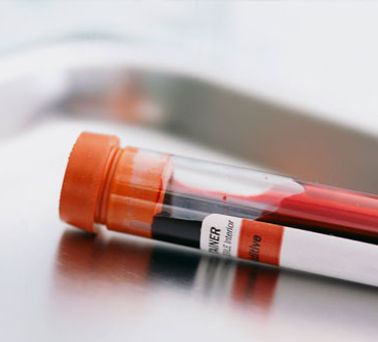
Flow cytometry is a specialised haematology service, which allows rapid and accurate diagnosis of leukaemia and lymphoma. Through the collaboration with OLCHC this service has been running at MNH since 2013 to a very high standard. We plan to continue this collaboration.
2. Centralised Paediatric Oncology Pathology Services
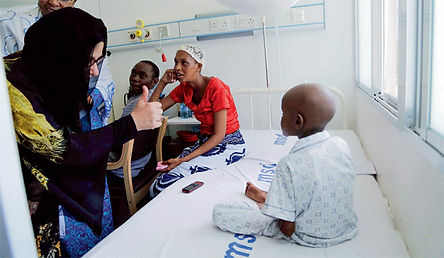
As part of the new laboratory services a paediatric oncology pathology unit will be developed within the main pathology laboratory at MNH. It is proposed that this unit will become the National centre for paediatric oncology pathology. As there is a critical shortage of pathologists in Tanzania this centre has agreed to offer pathology services for paediatric oncology services.
This centre will also act as an expat second opinion service for any site in Tanzania region.
it is proposed that only one centre of excellence in pathology for paediatric oncology be developed in the next 5 years (starting in 2016) in Tanzania. If agreed by all parties all specimens from all centres treating children with cancer in Tanzania will be sent to MNH for assessment and reporting.
3. Microbiology

Microbiology services are an essential element to the care and treatment of children with cancer. Chemotherapy and disease lead to severe compromise of the children’s immune systems. At present the culture and sensitivity services at MNH need considerable support.
4. Nutrition Programme

Many children present to our service extremely unwell and malnourished. In addition, for various illness and treatment related reasons, normal food (which is supplied by MNH daily) may not be tolerated or adequate to sustain these vulnerable children. Alternative food supplements are critical to speed recovery and assist chemotherapy tolerance. Fresh whole food plant based blended drinks and smoothies are a simple cheap nutritious and easily ingested and digested option.
It is internationally recommended to provide supplemental nutrition as part of the best paediatric oncology practice. Thanks to the support of organizations around Tanzania, we have been able to outfit a kitchen in the family hostel on the MNH campus and have now procured the necessary equipment. Each day TLM services mixes 100ltrs of nut milk/fruit/veg/spice smoothie blend is provided to each child admitted to the ward at MNH receives 1 cup each day and one full cup of a special porridge blend.
TLM has also started making body building protein balls that are served to every child and is currently the only site in the entire world that supports nutrition using locally sourced fresh whole foods.

As the children improve and progress on their treatment, it is essential that we continue supplementing their daily diet with healthy vegetables, fruits and vitamins. The nutrition programme’s aim is to improve digestive and immune health, prevent malnutrition and provide dietary supplements during treatment in order to help the children stay strong and nourished, so they can continue with their cancer treatment. Here are some of the delicious recipes that we make for the children everyday.
